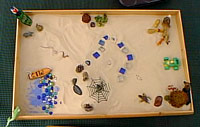|
Axline Principles of Play Therapy
Much of current play therapy practice is based upon Virginia Axline’s work*.
Her eight principles state that the therapist:
(1) Must develop a warm and friendly relationship with the child.
(2) Accepts the child as she or he is.
(3) Establishes a feeling of permission in the relationship so that the child feels free to express his or her feelings completely.
(4) Is alert to recognise the feelings the child is expressing and reflects these feelings back in such a manner that the child gains insight into his/her behaviour.
(5) Maintains a deep respect for the child’s ability to solve his/her problems and gives the child the opportunity to do so. The responsibility to make choices and to institute change is the child’s.
(6) Does not attempt to direct the child’s actions or conversations in any manner. The child leads the way, the therapist follows.
(7) Does not hurry the therapy along. It is a gradual process and must be recognised as such by the therapist.
(8) Only establishes those limitations necessary to anchor the therapy to the world of reality and to make the child aware of his/her responsibility in the relationship.
 These principles emphasise the importance of a practitioner being able to use a comprehensive range of play and expressive arts therapies skills – a 'Play Therapy Tool-KitTM' which will enable the therapist to follow the child's lead. These principles emphasise the importance of a practitioner being able to use a comprehensive range of play and expressive arts therapies skills – a 'Play Therapy Tool-KitTM' which will enable the therapist to follow the child's lead.
* Axline was influenced by the person centred approach of Carl Rogers. She is recognised as the originator of non directive Play Therapy. Her well known book 'Dibs: In Search of Self' written in 1964 which describes how she worked with Dibs and how he was able to heal himself over a period of time is an excellent introduction to the subject. Axline in turn influenced Violet Oaklander who added a gestalt therapy approach to play therapy and extended the 'tool-kit' concept as described in her book 'Windows to Our Children'. Dr Mark Barnes, the founder of PTI, integrated all of these approaches in his work with children, as described in the ‘Healing Path With Children’ and set the world’s first standards in play therapy training and education.
|